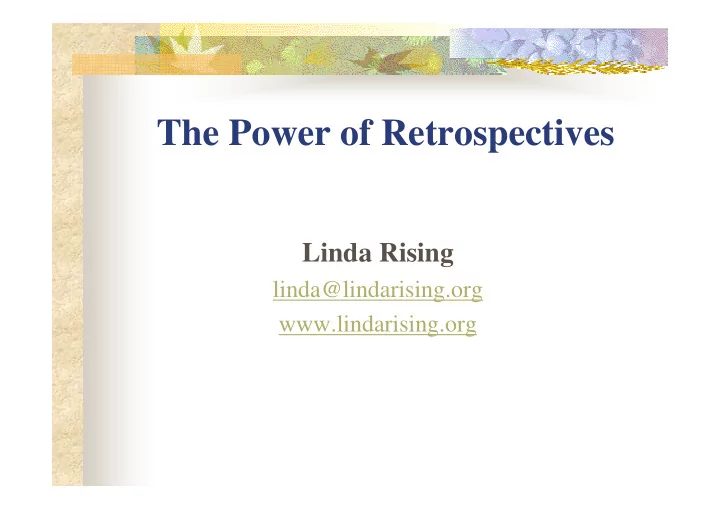

The Power of Retrospectives Linda Rising linda@lindarising.org www.lindarising.org
At regular intervals, the team reflects on how to become more effective, then tunes and adjusts its behavior accordingly. agilemanifesto.org/principles.html
Project Retrospectives A retrospective is an opportunity for the participants to learn how to improve. The focus is on learning—not fault-finding. Norm Kerth
Agile Retrospectives How to mine the experience of your software development team continually throughout the life of the project.
Reflect and find a better way Here is Edward Bear, coming downstairs now, bump, bump, bump, bump, on the back of his head, behind Christopher Robin. It is, as far as he knows, the only way of coming downstairs, but sometimes he feels that there is another way, if only he could stop bumping for a moment and think of it. A. A. Milne Winnie the Pooh
What is a retrospective? We have to test our knowledge constantly— using practices like retrospectives. These should be done after each iterative cycle rather than waiting until the end of the project. The quality of learning derived from this practice shows an organization’s true commitment to learning, and therefore, a key to its adaptability. Jim Highsmith
Why a retrospective? To learn from the past We want to believe that learning from experience is automatic, but it requires profound skills. Experience provides data, not knowledge.
Why a retrospective? To plan the future People want to improve themselves but usually they don’t know what to work on. When they get good feedback on specific goals, that releases the natural internal inclination to improve. James Fallows
Why a retrospective? To reach closure Research shows that when organizations go through changes, people have feelings and thoughts but no place to express them in the normal course of business. Thus, their experience is carried forward as a heaviness that slows them down and keeps them from moving into the new setting with enthusiasm.
Why a retrospective? To create a community I have seen whole-team reflection explain, discover, and teach so much. I believe that there is no better way to improve a team’s performance and quality. Norm Kerth
Retrospective Examples Military: After Action Reviews, Navy Lessons Learned, Coast Guard Uniform Lessons Learned Post-Fire Critiques chiefmontagna.com/Articles/post%20fire%20critique.htm chiefmontagna.com/Articles/post%20fire%20critique.htm chiefmontagna.com/Articles/post%20fire%20critique.htm chiefmontagna.com/Articles/post%20fire%20critique.htm The CEO & The Monk – corporate funeral
What a retrospective isn’t No naming, no blaming. Kerth’s Prime Directive: Regardless of what we discover, we must understand and truly believe that everyone did the best job he or she could, given what was known at the time, his or her skills and abilities, the resources available, and the situation at hand.
Why take so much time? Memories are short and selective We tend to focus on recent events, especially if they are painful Humans need help to remember, to translate experience (data) into learning (knowledge) External facilitation is required
What are the driving questions? � What worked well that we don’t want to forget? � What should we do differently? � What did we learn? � What still puzzles us?
The Timeline Exercise
Many of the improvements people make as a result of retrospectives are things that people have been talking about among themselves for some time, but those discussions by themselves never developed the horsepower to actually make the desired changes happen. It takes critical mass with a common understanding, such as is developed in a retrospective where all perspectives are represented, considered, and included as a part of the planning process. "The Whole Enchilada: Effectively Blending, Management, Planning & Technical Practices," Joshua Kerievsky.
How is knowledge shared? � Web postings � Posters � Team meetings, staff meetings, tech forums � Patterns
Next Steps � Buy and read Norm Kerth’s book: Project Retrospectives , Dorset House, 2001 � Buy and read Esther Derby and Diana Larsen's book: Agile Retrospectives , The Pragmatic Bookshelf, 2006 � Check out Linda’s web site – click on Articles � Sign up for the Yahoo group: retrospectives
Retrospectives a closing thought from Norm Kerth (and Edward Bear) … we bump our heads in project after project, day after day. If we would only take a moment to stop and think of alternative ways to proceed, I’m sure we could find better ways to do our work. Norm Kerth
A mini-retro for planning JAOO ‘09 � Keep � Change � Puzzles – “Why ….” � “I hope….” or “I wish….”
Recommend
More recommend